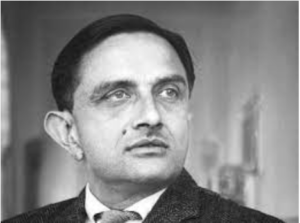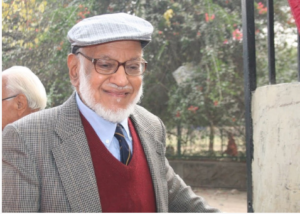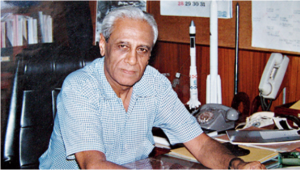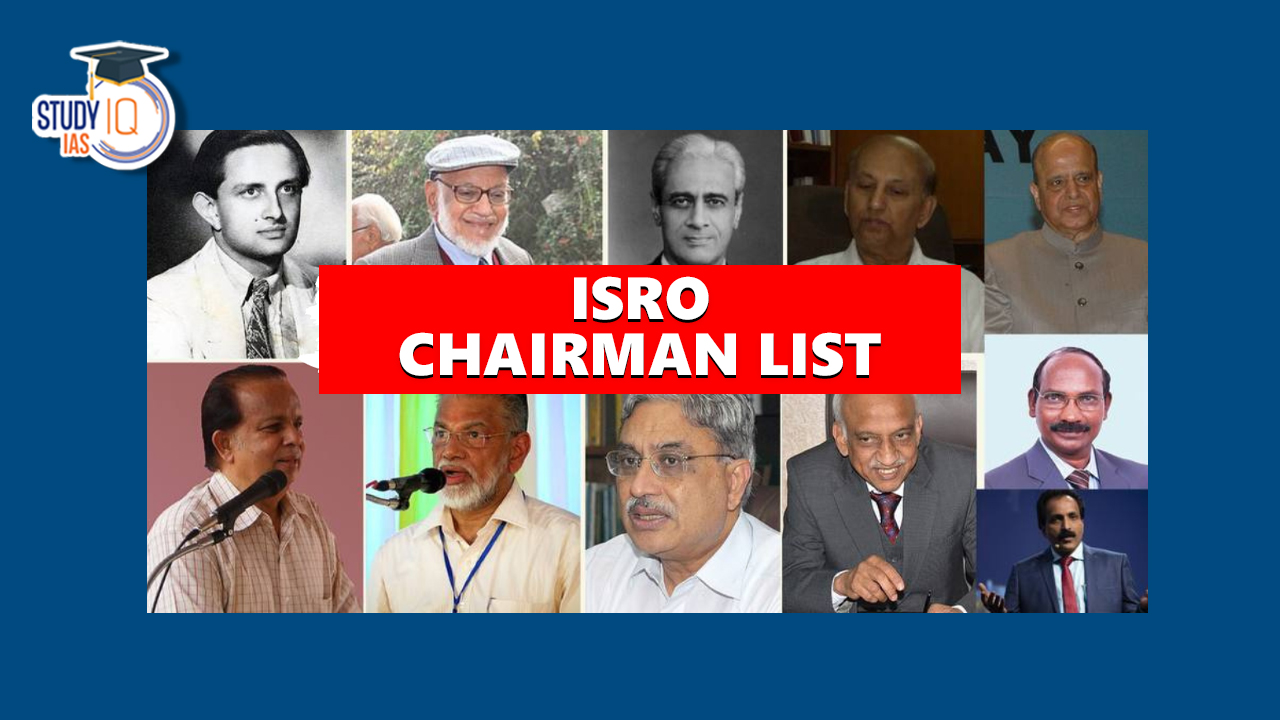Table of Contents
The Indian Space Research Organisation (ISRO) is India’s premier space agency, responsible for overseeing and executing the country’s space missions. Established in 1969, ISRO has had a significant impact on both the scientific and technological landscape of India and the world. The journey of ISRO began even earlier, in 1962, with the formation of the Indian National Committee for Space Research (INCOSPAR), which later transformed into ISRO.
Over the years, ISRO has had visionary leaders who have guided the organization through a series of remarkable achievements, including satellite launches, lunar explorations, and space technology advancements. Here, we take a look at the list of ISRO Chairmen, their tenures, and some of the key contributions they made.
V Narayanan New Chief of ISRO
Who is Current Chairman of ISRO?
Indian Space Research Organisation (ISRO)
ISRO, which is the name of India’s space agency headquartered in Bengaluru. This organization reports to the Department of Space (DOS) as its parent, which is directly under the control of the Indian Prime Minister. The chairman of ISRO also serves as an executive for DOS. On July 14th, ISRO made a significant accomplishment by successfully launching Chandryaan 3.
The Chandryaan 3 mission, launched from Sriharikota in Andhra Pradesh, carries the hopes of an entire nation. It demonstrates India’s ambition and tenacity to become the fourth nation to conduct a controlled landing on the moon successfully, joining the ranks of the United States, China, and Russia.
ISRO Chairman Lists From 1963 to 2024
There have been 11 ISRO Chairpersons appointed since 1963. On January 12, 2022, the Appointments Committee of the Cabinet (ACC) named Somanath S the eleventh and the present ISRO chairman. Former ISRO Chairman Dr K. Sivan took over in January 2018 and succeeded him. The First ISRO chairman was Dr Vikram Sarabhai
| No. | Name | Tenure | Key Contributions |
|---|---|---|---|
| 1 | Dr. Vikram Sarabhai | 1963 – 1971 | Father of the Indian Space Program; Established Thumba Equatorial Rocket Launching Station |
| 2 | Prof. M. G. K. Menon | January 1972 – September 1972 | Early work in cosmic rays; Continued Sarabhai’s vision in India’s space program |
| 3 | Prof. Satish Dhawan | 1972 – 1984 | Led development of PSLV and INSAT; Strengthened India’s operational satellite systems |
| 4 | Prof. U. R. Rao | 1984 – 1994 | Designed India’s first satellite Aryabhata; Expanded satellite communication and Earth observation systems |
| 5 | Dr. K. Kasturirangan | 1994 – 2003 | Spearheaded PSLV and GSLV missions; Pioneered Earth observation satellites like Bhaskara-I & II |
| 6 | G. Madhavan Nair | 2003 – 2009 | Launched Chandrayaan-1; Conducted 25 successful missions |
| 7 | Dr. K. Radhakrishnan | 2009 – 2014 | Led India’s first Mars mission (Mangalyaan); Set up India’s human spaceflight program |
| 8 | Dr. Shailesh Nayak (Interim) | January 2015 | Short tenure; Notable contributions in oceanography and remote sensing |
| 9 | A. S. Kiran Kumar | 2015 – 2018 | Oversaw Mars Orbiter Mission (Mangalyaan); Established IRNSS, India’s GPS system |
| 10 | Dr. K. Sivan | 2018 – 2022 | Led Chandrayaan-2 mission; Initiated India’s Gaganyaan (human spaceflight) program |
| 11 | S. Somanath | 2022 – Present | Successful Chandrayaan-3 landing; Launched Aditya L-1 mission to study the sun |
Important Facts Related to ISRO Chairman
- Aryabhata, India’s first satellite, was launched in 1975.
- Atal Bihari Vajpayee, a former prime minister, announced Chandrayaan-1, India’s first lunar mission, on August 15, 2003. In 2008, the rocket was put into flight. Since it was established, ISRO has had 11 chairmen. Dr. Vikram Sarabhai, regarded as the founder of the Indian space programme, served as ISRO’s first chairman.
- Somanath S is the ISRO’s chairman at the moment. He oversaw the Chandrayaan 3 project and is one of the minds behind India’s ambition to set foot on the moon.
- Dr. Shailesh Nayak has previously worked on projects involving remote sensing and the ocean. For 11 days, he presided as the acting director general of the Indian Space Research Organisation (ISRO).
Check out the linked article on the Chandrayaan 4 Mission Here!
ISRO Chairman List Important Facts
Dr. Vikram Sarabhai

Who led India’s space programme from 1963 to 1972, is regarded as its founder. These institutes were created by Vikram Sarabhai:
- Physical Research Laboratory (PRL), Ahmedabad.
- Indian Institute of Management (IIM), Ahmedabad
- Vikram Sarabhai Space Centre, Thiruvananthapuram
- Faster Breeder Test Reactor (FBTR), Kalpakkam
Prof. M. G. K. Menon (Jan-Sep 1972):

He was well-known for his work on particle physics and cosmic rays, especially the high-energy interactions of elementary particles.
Prof. Satish Dhawan (1972-1984):

In 1972, he took over as chairman of the Indian Space Research Organisation (ISRO), succeeding Vikram Sarabhai, who started the country’s space effort. His work resulted in the functioning systems INSAT and PSLV in India.
Prof. Udupi Ramachandra Rao (1984-1994):
In 1972, Dr. Rao took on the job of establishing satellite technology in India. In 1975, he played a key role in creating the first Indian satellite, Aryabhata.
Dr. Krishnaswamy Kasturirangan (1994-2003):
Under his direction as ISRO Chairman, PSLV and GSLV have achieved numerous significant milestones for the space programme. Additionally, he oversaw the construction of India’s first two experimental BHASKARA-I and II earth observation satellites.
Shri G.Madhavan Nair (2003-2009):
The first Indian lunar lander was named Chandrayaan-1. Shri G. Madhavan Nair served as the chairman during its launch. ISRO completed 25 successful flights during his six-year stint as Chairman and Secretary.
Dr. K. Radhakrishnan (2009-2014):
Under his leadership, Mr. K. Radhakrishnan oversaw the launch of India’s first interplanetary mission, Mangalyaan.
Shri A S Kiran Kumar (2015 to 2018):
He performed admirably throughout the launch of India’s Chandrayaan-1 and Mars Orbiter Mission. Under his direction, the GAGAN and Indian National Regional Navigation System (IRNSS) have been built.
Dr. K. Sivan (2018 to 2022):
He made a significant contribution to the planning, design, integration, and analysis of the entire mission. Chandrayaan-2 was launched during his administration, and India’s manned space programme has accelerated.


 Repo Rate and Reverse Repo Rate, Impact ...
Repo Rate and Reverse Repo Rate, Impact ...
 Foreign Contribution Regulation Act (FCR...
Foreign Contribution Regulation Act (FCR...
 Urban Cooperative Banks in India, Functi...
Urban Cooperative Banks in India, Functi...





















